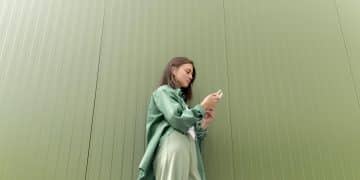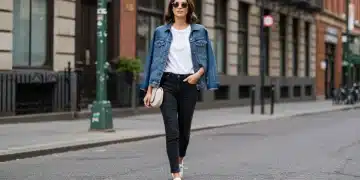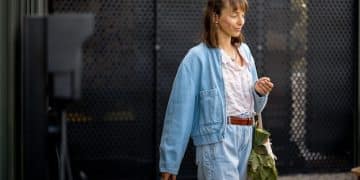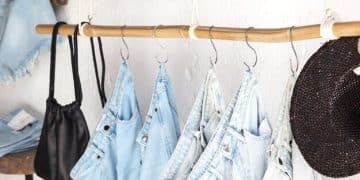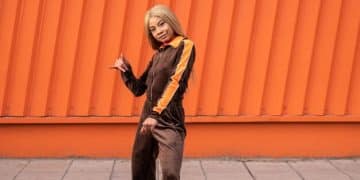Effortless Style: Casual Outfit Color Combinations That Always Work
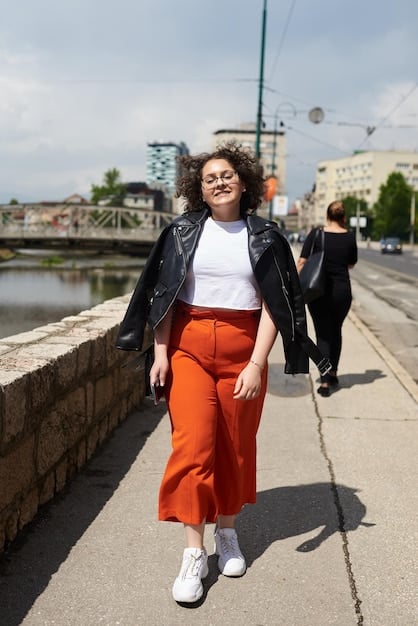
Casual outfit color combinations are essential for creating an effortlessly stylish look. From classic neutrals to bold pairings, understanding how colors work together can elevate your everyday wardrobe and make dressing easier.
Mastering casual outfit color combinations that always work is the key to effortless style. Forget agonizing over what to wear; with a few simple guidelines, you can unlock endless stylish possibilities. Let’s explore fail-safe color pairings that will elevate your casual wardrobe.
Why Color Combinations Matter in Casual Outfits
Color combinations are more than just aesthetics; they’re a powerful tool in creating a cohesive and stylish casual look. Understanding basic color theory can transform your wardrobe from drab to fab. The right color pairings can create a flattering silhouette, express your personality, and even influence how others perceive you.
The Impact of Color Psychology
Different colors evoke different emotions and associations. Consider how you want your outfit to make you (and others) feel. For instance, blue often conveys calmness and professionalism, while red signals energy and confidence. Choosing colors that align with your mood and intentions can enhance the overall impact of your outfit.
Creating a Cohesive Look
A well-coordinated color palette creates a sense of harmony and balance. Mixing and matching colors intentionally, rather than haphazardly, results in a more polished and put-together appearance. Even in a casual setting, this attention to detail elevates your style.
- Neutral + Pop: Combine classic neutrals like black, white, or beige with a single vibrant color.
- Monochromatic: Wear different shades of the same color family for a subtle yet stylish effect.
- Complementary Colors: Pair colors opposite each other on the color wheel (e.g., blue and orange) for a bolder statement.
In essence, understanding how colors interact allows you to curate outfits that are not only visually appealing but also personally meaningful. This knowledge simplifies the dressing process and ensures you always look your best, even in your most casual attire.
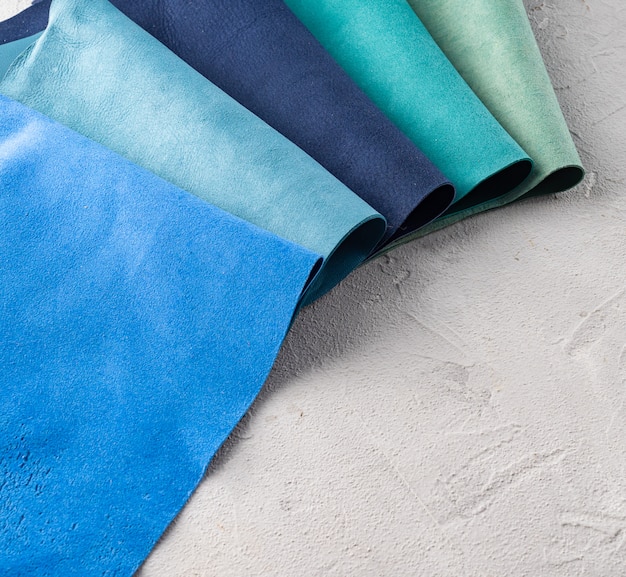
Classic Neutral Color Combinations
Neutral color combinations are the foundation of any versatile wardrobe. They’re timeless, easy to wear, and provide a blank canvas for accessorizing. Mastering these pairings allows you to create sophisticated and understated looks for any casual occasion.
Black and White: The Ultimate Duo
Black and white is a classic combination that never goes out of style. It’s sophisticated, chic, and incredibly versatile. A simple white t-shirt paired with black jeans or a black skirt creates an effortlessly cool look. Add a statement accessory, like a colorful scarf or bold jewelry, to personalize the outfit.
Gray and Beige: Subtle Elegance
Gray and beige offer a softer, more subtle alternative to black and white. This pairing is perfect for creating a calm and understated look. A gray sweater paired with beige chinos or a beige coat over a gray dress creates a harmonious color palette.
Navy and White: A Nautical Touch
Navy and white evokes a nautical vibe that’s perfect for spring and summer. This combination is clean, crisp, and effortlessly stylish. A navy blazer paired with white jeans or a white sundress with navy accents creates a fresh and timeless outfit.
- Accessorize with Metallics: Add gold or silver jewelry to elevate neutral outfits.
- Play with Textures: Mix different textures, like knitwear and denim, for added visual interest.
- Focus on Fit: Ensure your garments fit well for a polished and put-together look.
Neutral color combinations are incredibly versatile and can be adapted to suit any personal style. By experimenting with different textures, silhouettes, and accessories, you can create endless stylish outfits based on these timeless pairings.
Adding a Pop of Color to Neutral Outfits
While neutral colors are essential, adding a pop of color can inject personality and vibrancy into your casual outfits. A strategically placed splash of color can transform a simple outfit into a statement-making ensemble. Here’s how to incorporate color effectively.
Red: The Color of Confidence
Red is a bold and attention-grabbing color that adds instant energy to any outfit. Pair a red top with neutral bottoms, or add a red handbag or shoes to a monochrome look. A touch of red exudes confidence and makes a strong style statement.
Yellow: Sunshine and Optimism
Yellow brings a sense of warmth and optimism to your wardrobe. A yellow sweater or scarf can brighten up a neutral outfit, especially during the cooler months. Use yellow sparingly to avoid overwhelming the overall look.
Green: Earthy and Fresh
Green adds a touch of nature and freshness to your style. Pair a green jacket or blouse with beige or denim for a relaxed, earthy vibe. Green accessories, like a bag or a belt, can also add a subtle pop of color.
- Color Blocking: Experiment with bold color combinations, like blue and orange or pink and green.
- Accessorize Wisely: Choose accessories in complementary colors to enhance your outfit.
- Consider the Season: Opt for brighter colors in spring and summer and deeper tones in fall and winter.
Adding a pop of color is a simple yet effective way to elevate your neutral outfits and express your personal style. Don’t be afraid to experiment with different hues and find the colors that make you feel confident and stylish.
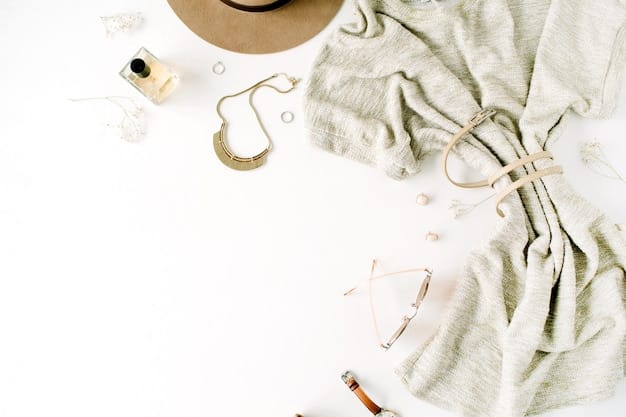
Monochromatic Color Schemes for Casual Wear
Monochromatic color schemes involve wearing different shades and tints of the same color. This approach creates a cohesive and sophisticated look that’s easy to pull off. Monochromatic outfits are inherently stylish and can be adapted for various casual occasions.
Shades of Gray: Effortless Cool
Wearing different shades of gray creates a sleek and modern look. Combine a light gray sweater with dark gray trousers or a charcoal gray coat over a heather gray dress. Varying the shades adds depth and dimension to the outfit.
Blues on Blues: Calm and Collected
Blue is a versatile color that works well in monochromatic schemes. Pair a light blue shirt with dark blue jeans or a navy blazer over a light blue dress. This combination is both calming and stylish.
Earthy Tones: Natural Harmony
Explore different shades of brown, beige, and olive green for an earthy and harmonious look. Combine a beige sweater with brown pants or an olive green jacket over a khaki dress. This palette is perfect for creating a relaxed and understated vibe.
Tips for Rocking Monochromatic Looks
- Texture is Key: Mix different textures to add visual interest and prevent the outfit from looking flat.
- Play with Shades: Vary the shades of the color to create depth and dimension.
- Accessorize Thoughtfully: Choose accessories that complement the color scheme.
Monochromatic outfits are a simple yet stylish way to elevate your casual wardrobe. By focusing on texture, shade variation, and thoughtful accessorizing, you can create a cohesive and fashionable look that’s effortlessly chic.
Complementary Color Combinations for Bold Statements
Complementary colors are pairs of colors that sit opposite each other on the color wheel, such as blue and orange, red and green, and yellow and purple. When used together, they create a vibrant and eye-catching contrast. Using complementary colors in your casual outfits can make a bold and stylish statement.
Blue and Orange: Dynamic Contrast
Blue and orange is a dynamic and energetic combination. Pair a blue top with orange accessories or an orange dress with blue shoes. This pairing is perfect for making a statement and showcasing your confident style.
Red and Green: Festive and Bold
Red and green is a classic combination that can be bold and festive. In a more casual setting, try pairing an olive green jacket with a red scarf or a red top with green pants. This pairing is especially striking during the holiday season, but can be adapted for year-round wear.
Yellow and Purple: Playful and Unique
Yellow and purple create a playful and unique combination. Pair a yellow sweater with purple trousers or a purple dress with yellow accessories. This pairing is unexpected and fun, perfect for expressing your individuality.
Mastering Complementary Colors
- Balance is Key: Use one color as the main focus and the other as an accent.
- Tone it Down: Opt for muted shades of complementary colors for a more subtle look.
- Accessorize Wisely: Choose accessories that enhance the color combination without overpowering it.
Complementary color combinations are a fantastic way to add excitement and personality to your casual outfits. By balancing the colors and choosing the right shades, you can create bold and stylish looks that turn heads.
Seasonal Color Palettes for Casual Outfits
The seasons can significantly influence your color choices in casual outfits. Each season has its own unique palette that reflects the natural surroundings. Aligning your wardrobe with seasonal colors can enhance your style and keep you looking fresh and relevant.
Spring: Fresh and Light
Spring is a time for fresh, light colors like pastels, soft greens, and floral hues. Think light pinks, baby blues, mint greens, and delicate yellows. These colors reflect the blooming flowers and new beginnings of the season.
Summer: Bright and Bold
Summer calls for bright, bold colors like vibrant blues, sunny yellows, and tropical greens. These colors capture the energy and vibrancy of the summer months. Don’t be afraid to experiment with adventurous combinations.
Fall: Warm and Earthy
Fall is all about warm, earthy tones like oranges, reds, browns, and deep greens. These colors reflect the changing leaves and cozy atmosphere of autumn. Incorporate these hues into your sweaters, jackets, and scarves.
Winter: Rich and Deep
Winter embraces rich, deep colors like burgundy, navy, forest green, and charcoal gray. These colors evoke a sense of warmth and sophistication. Layer these hues to create cozy and stylish winter outfits.
Adapting Your Wardrobe to the Seasons
- Seasonal Accessories: Use accessories to incorporate seasonal colors into your outfits.
- Layering: Layer different colors and textures to create depth and interest.
- Transitional Pieces: Invest in versatile pieces that can be worn across multiple seasons.
Incorporating seasonal color palettes into your casual outfits is a great way to stay stylish and connected to the natural world. Each season offers unique opportunities to experiment with colors and express your personal style.
| Key Point | Brief Description |
|---|---|
| 🎨 Neutral Combos | Classic, versatile pairings like black & white or gray & beige. |
| 🌈 Pop of Color | Adding a vibrant color like red or yellow to neutral outfits. |
| 👗 Monochromatic | Wearing different shades of the same color for a chic look. |
| 🔄 Seasonal Colors | Choosing colors that align with the current season’s palette. |
FAQ
▼
Some classic and reliable neutral color combinations include black and white, gray and beige, and navy and white. These pairings are versatile and easy to style.
▼
Adding a pop of color to a neutral outfit can be achieved by incorporating vibrant accessories such as a red scarf, a yellow handbag, or green shoes.
▼
A monochromatic color scheme involves wearing different shades and tints of the same color. This creates a cohesive and stylish look that’s easy to achieve.
▼
Complementary colors are pairs of colors that sit opposite each other on the color wheel, such as blue and orange, red and green, and yellow and purple. They create a vibrant and eye-catching contrast.
▼
Align your outfit colors with the season by opting for light pastels in spring, bright colors in summer, warm tones in fall, deep hues in winter to reflect the natural surroundings.
Conclusion
Mastering casual outfit color combinations is a simple way to elevate your style. By understanding basic color principles and experimenting with different pairings, you can create effortlessly chic looks for any occasion. Whether you prefer classic neutrals, bold complementary colors, or stylish monochromatic schemes, the key is to have fun and express your personal style.
